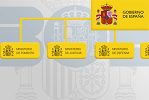Rules on staff representation
Content
Representation of workers in companies
Workers’ rights to collective representation are regulated by the Workers’ Statute, Title II .
Within companies, workers can select people to represent them. These people form part of the representative bodies. There are two types:
- Staff representatives
- They are selected in companies or workplaces with between 11 and 49 employees.
- If a company has between 6 and 10 workers, a representative can also be chosen, if the majority of the workers agree.
- Works councils
- Works councils are set up in workplaces with 50 or more workers.
What happens if there are several small workplaces?
- If a company has several premises in the same province or nearby towns, and no single premise has 50 workers, but combined they do, a joint works council can be set up for all of them.
- If some premises have 50 or more workers but others do not, the following applies:
- Premises with 50 or more workers form their own works council.
- The other premises (those with less than 50 workers) form a separate joint council.
Inter-premises councils
- This type of council may only be created if the collective agreement allows.
- It may have a maximum of 13 members.
- These people should be chosen from among the members of the works councils of the different premises.
These representative bodies (representatives or councils) must be informed and consulted in all circumstances described in Article 64 of the Workers’ Statute .
The procedure for the selection of worker representatives is governed by Articles 67 et seq. of the Workers’ Statute, and in its twenty-eighth additional provision on artists working in the performing, audiovisual and musical arts.
Elections can be instigated by:
- the most representative trade union organisations (at state or autonomous community level), or
- union organisations with 10% or more of the representatives at a company, or
- workers in a workplace by majority agreement.
The following rules apply:
- Voters: All workers at a company or workplace aged over 16 and who have been working at a company for at least one month.
- Eligible candidates: Workers aged at least 18 who have been at the company for at least six months are eligible, except in the case of roles for which, due to staff mobility, a shorter period may be agreed in a collective agreement (with a minimum tenure of three months).
- Foreign workers: foreign workers can be voters and eligible candidates on equal terms with all other workers.
How long do worker representatives’ mandates last?
Worker representatives and members of a works council should be elected for four years, on the understanding that they will remain in office with their powers and their guarantees until new elections have been initiated and held.
Right to form and become a member of trade unions
The right to organise, which is included in the Spanish Constitution (CE), means that ‘everyone has the right to freely join a trade union’ ( Article 28.1 CE![]() ).
).
This right is regulated in Organic Law 11/1985 of 2 August on the Right to Organise (LOLS)![]() .
.
Exercising trade union activity ( Art. 2 LOLS![]() ) includes the following: the right to collective bargaining, to strike, to raise individual and collective labour disputes and to present candidacies for the election of Works Councils and Staff Delegates and for the corresponding bodies of Public Administrations.
) includes the following: the right to collective bargaining, to strike, to raise individual and collective labour disputes and to present candidacies for the election of Works Councils and Staff Delegates and for the corresponding bodies of Public Administrations.
In accordance with Article 8 LOLS![]() , workers who are affiliated with a trade union at their company or workplace can:
, workers who are affiliated with a trade union at their company or workplace can:
- Establish Union Sections according to the by-laws of the Trade Union.
- Hold meetings (subject to notifying the employer), collect duties and distribute union information, outside of work hours and without disturbing the normal activity of the company.
- Receive the information sent to them by their trade union.
Worker representatives enjoy a series of guarantees, whether they are staff delegates, members of works councils or union delegates (included in Art. 68 ET![]() and in Art. 10.3 of the LOLS):
and in Art. 10.3 of the LOLS):
- The opening of a contradictory proceeding in penalty proceedings.
- Priority for remaining at a company or workplace that is in suspension or winding up for technological or economic reasons.
- Not being dismissed or penalised during the exercise of their duties or within one year following the end of their term of office.
- Freely expressing their opinions within the sphere of their representation, and they may publish or distribute publications during work hours.
- Having remunerated monthly time-off rights.
Violations of the rights of representatives
Who is responsible for safeguarding the rights of representatives?
The Labour and Social Security Inspectorate .
Infringements
Infringements in this area (which are covered under Articles 7, 8, 9, 10(1), 12 and 15 of the Law on social order infringements and sanctions ) concern matters such as the ones set out below.
- Violation of worker representatives’ and union delegates’ right to information, to be heard and to be consulted.
- Violation of the rights of worker representatives and of trade union branches regarding adequate paid time allocation and premises for carrying out their activities, and the provision of notice boards.
- Violation of the rights of trade union branches regarding the collection of fees or the distribution and receipt of trade union information.
- Actions or omissions that prevent the exercise of workers’, worker representatives’ or trade union branches’ right to assembly.
- Violation of the right to attend and access workplaces by those who hold provincial, regional or national elected positions in the most representative trade union organisations.
- Violation of the material duty to cooperate incumbent on employers pursuant to the regulations on the processes for electing worker representatives.
- Unilateral decisions by the company that give rise to direct or indirect favourable or unfavourable discrimination regarding the pay, working hours, training, advancement or other working conditions, including on the basis of participation or non-participation in trade unions or their agreements.
- Violation of the normative clauses on trade union matters laid down in collective agreements.
- The employer’s refusal to reopen the workplace within the established period when required to do so by the competent labour authority following a lockout.
- Acts by the employer that undermine the workers’ right to strike, consisting of replacing striking workers with other workers with no ties to the workplace at the time of the strike, except in the circumstances justified by law.
- Failure to comply with workers’ rights to information, consultation and participation recognised in the legislation on the prevention of occupational risks.
- Failure to provide appropriate training or equipment to workers appointed to risk prevention activities and to prevention representatives for the performance of their duties.
- Failure to notify workers’ legal representatives of fixed-term contracts agreed or failure to provide them with a basic copy of the relevant contracts in due time where such an obligation exists.
More information
More information on the EURES page about worker representation in Spain.![]()
Information for each Autonomous Community







Andalucía Aragón Asturias, Principado de Balears, Illes Canarias Cantabria Castilla y León Castilla-La Mancha Cataluña Ciudad de Ceuta Ciudad de Melilla Comunitat Valenciana Extremadura Galicia Madrid, Comunidad de Murcia, Región de Navarra, Comunidad Foral de País Vasco Rioja, La










